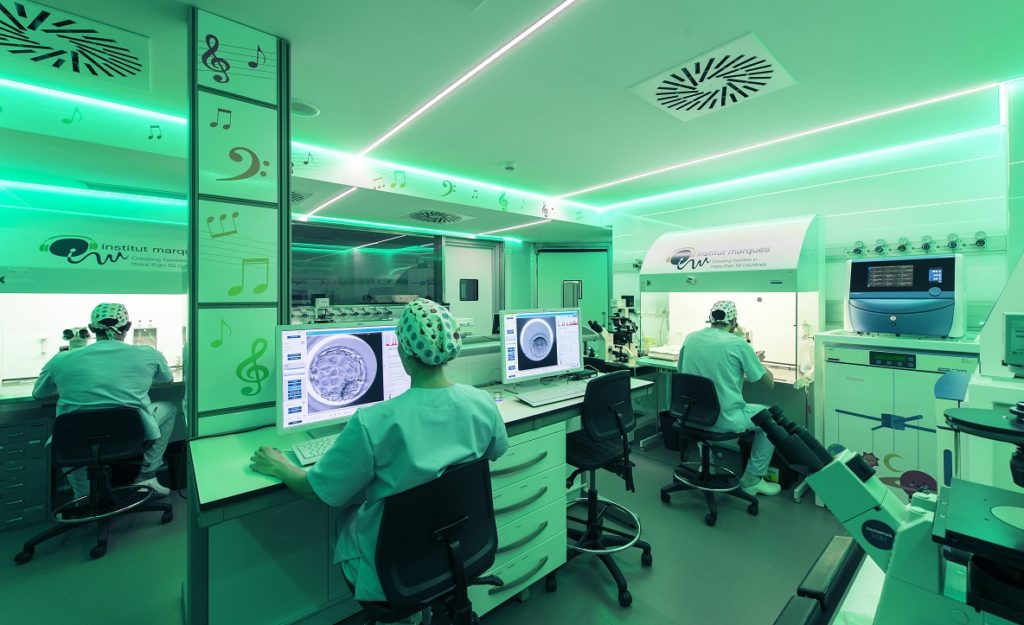The Institut Marquès reports on how “surplus” embryos from different European clinics can be donated to other families. More than 2,000 babies have already been born through this initiative. The greater awareness of cross-border embryo adoption follows growing concern from IVF specialists in the US following the overturning of Roe v. Wade.
Freelancers, consultants, nurses and locums that specialise in fertility could be looking further into cross-border embryo adoption for their patients. And for those that desperately want to start and raise a family, this option may be something they never knew was possible.
According to a study by Institut Marquès, 63% of British patients who complete an Assisted Reproduction cycle do not communicate the destination they wish to give to the embryos they did not use in the treatment they followed to become parents. Could this soon change with greater awareness of existing embryo adoptions?
How the concept of embryo adoption started
In 2004, Institut Marquès, an international centre for Assisted Reproduction, decided to adopt the embryos that remained “undestined” in its laboratories. 18 years later, patients of 124 nationalities have come to this centre in Barcelona to adopt them.
More than 2,000 babies have been born through this initiative.

Under Spanish law, the donation of frozen “surplus” embryos after an Assisted Reproduction treatment is possible. A concept that could be equally seen as controversial and a major breakthrough for those desperate to start a family but have been faced with fertility challenges.
The concept of adoption in this way is made possible when patients request the transfer of their “surplus” embryos so that they can be adopted.
“This is a pioneering programme that takes in embryos from young, healthy couples who successfully completed their In Vitro Fertilisation cycle and entrusted the clinic with the future of those they no longer needed,” explains the Institut.
World-wide recognition of embryo adoption
Since its implementation, the Embryo Adoption programme of Institut Marquès has been very well received by different groups. Its international impact has led people from all over the world to contact the centre expressly to offer their embryos, which are frozen in other clinics, as donations.
Institut Marquès has presented this phenomenon to the European medical community with a presentation at the 38th Congress of the European Society of Human Reproduction (ESHRE) which was being held until 6 July in Milan.
As Dr. Borja Marquès explained in his presentation at the ESHRE:
After IVF treatment, many patients have frozen embryos. In most European countries, the laws do not allow patients to decide the fate of their “supernumerary” embryos. More and more people decide to donate them so that other people can also become parents.
Many of these patients contact us because they have heard about our Embryo Adoption programme and want to send us their embryos from the clinic where they are frozen.
In 2018, Institut Marquès began receiving requests from all over the world from patients requesting the transfer of their surplus embryos to the Barcelona clinic. Due to legal difficulties, only cases from European countries are currently being studied.
Forty-seven cases have been evaluated and 17 embryos from Italy, Belgium, Ireland and Greece have been accepted. In order to be accepted, these embryos must meet certain essential medical requirements and have all the information from the embryology laboratory from which they originate.
Most people who keep their embryos frozen in different European countries do not know that there is the possibility of donating them to an Embryo Adoption programme in Spain.
Dr López-Teijón, Director of Institut Marquès, says “that is why we cannot really know what percentage of patients who wish to donate their ‘cross-border’ embryos would be able to do so. The requests that we have received at Institut Marquès come from patients of a high socioeconomic and cultural level who can be informed and take charge of the transfer of their embryos to Spain.”
The majority prefer the clinic to choose the destination of the frozen embryos, according to the Institut.
In Spain, patients who complete reproductive cycles have the option of either keeping them at the cost of preservation, donating them to research or to other couples, or destroying them.
According to a study by Institut Marquès, 63% of British patients who complete an Assisted Reproduction cycle do not communicate the destination they wish to give to the embryos they did not use in the treatment they followed to become parents.
The Spanish law establishes that, after two requests without response from the patients, the embryos become available to the clinics, which can choose to destroy them or keep them for research or, as in the case of Institut Marquès, offer them as a donation to other couples.
Dr López-Teijón explains that patients prefer not to respond to the clinic’s requests because “this decision poses a difficult situation and triggers emotional conflicts. They value the embryos so much that they prefer us to choose the best option for them”.
The data from the study of Institut Marquès referring to UK reported that 63% of British patients do not communicate the destiny they wish to give to the embryos that they did not use in the treatment they followed to become parents and leave their future in the hands of the clinic. Some 29% opt to keep them, assuming the cost of their preservation. 3% per cent opt to destroy them, 3% decide to offer them for research and 2% prefer donating them to other couples.
How will new anti-abortion laws in the US impact IVF?

Since the U.S. Supreme Court overturned Roe v. Wade — the 1973 ruling that established abortion as a constitutional right — patients suffering from infertility and their doctors have grown concerned that fertility treatments, particularly IVF, could be affected by new state abortion bans, Yahhoo News reported this week.
“At least 13 states, many of which had so-called trigger laws in place, have completely banned or severely limited abortions since the high court ruling on June 24, and more are expected to ban the procedure. According to the Guttmacher Institute, a research organization that supports abortion rights, 26 states are certain or likely to ban abortion now that Roe has been repealed.
“While the main target of these bans is to restrict abortion care, fertility and legal experts say that without the protection of Roe v. Wade, state lawmakers could introduce abortion legislation that could potentially threaten access to family-building treatments such as IVF,” said the report.


